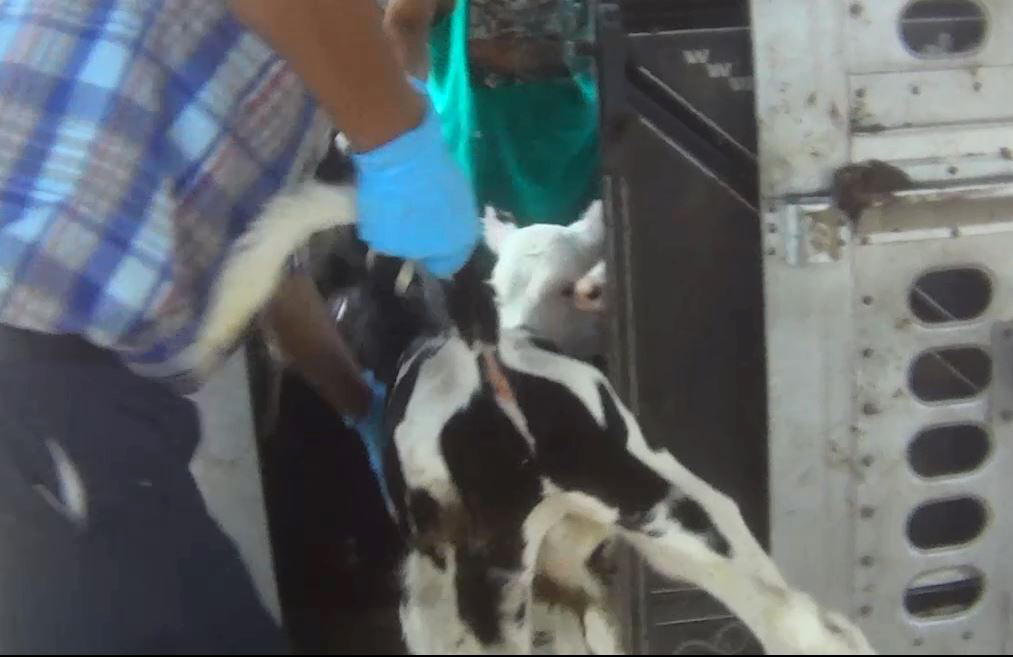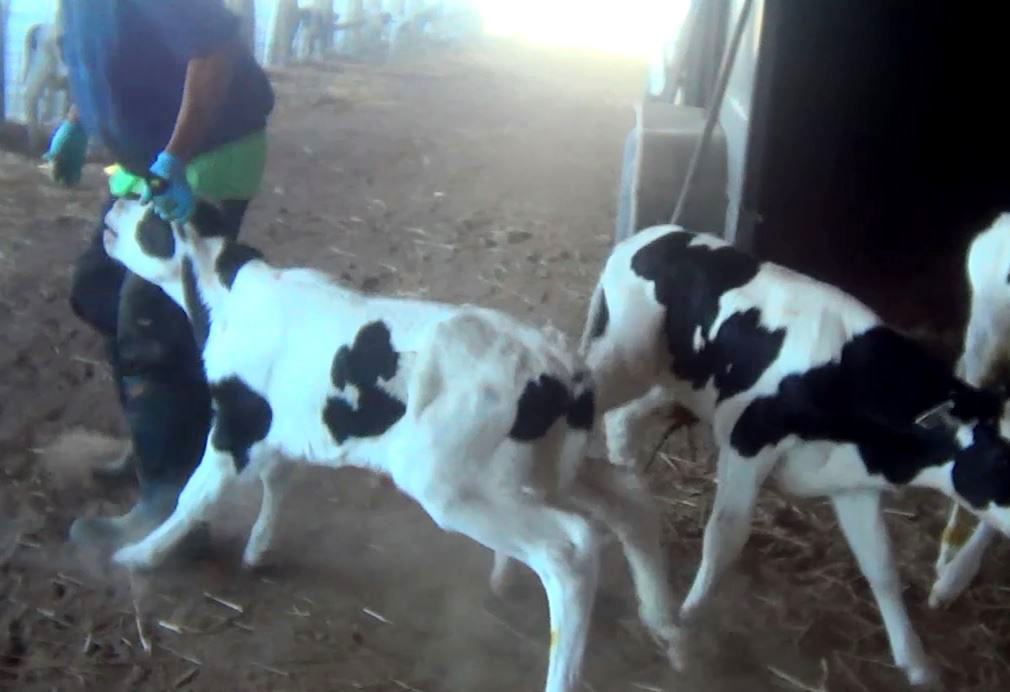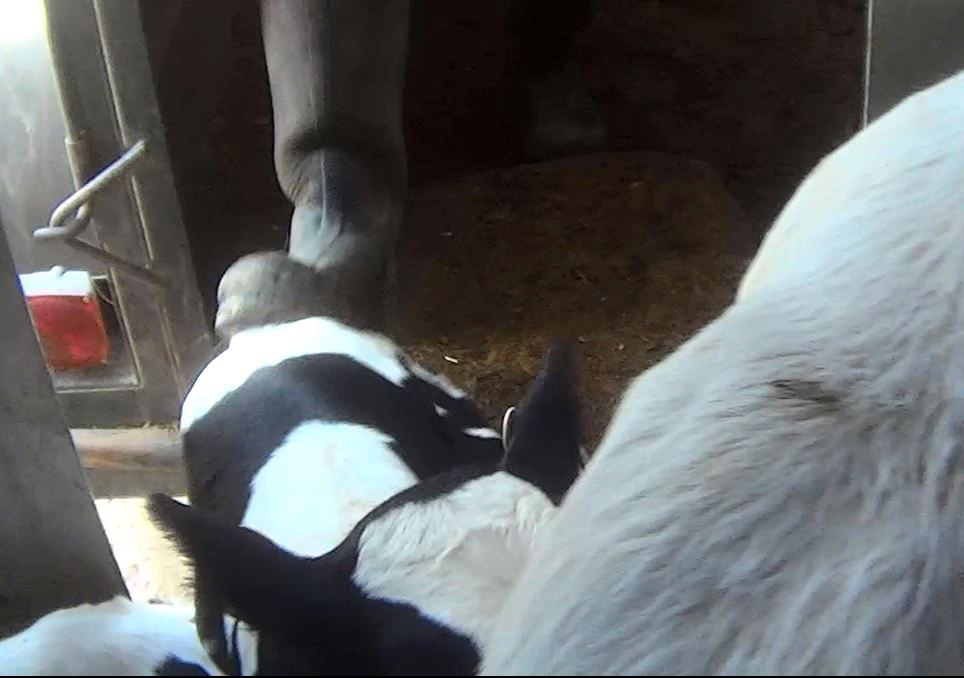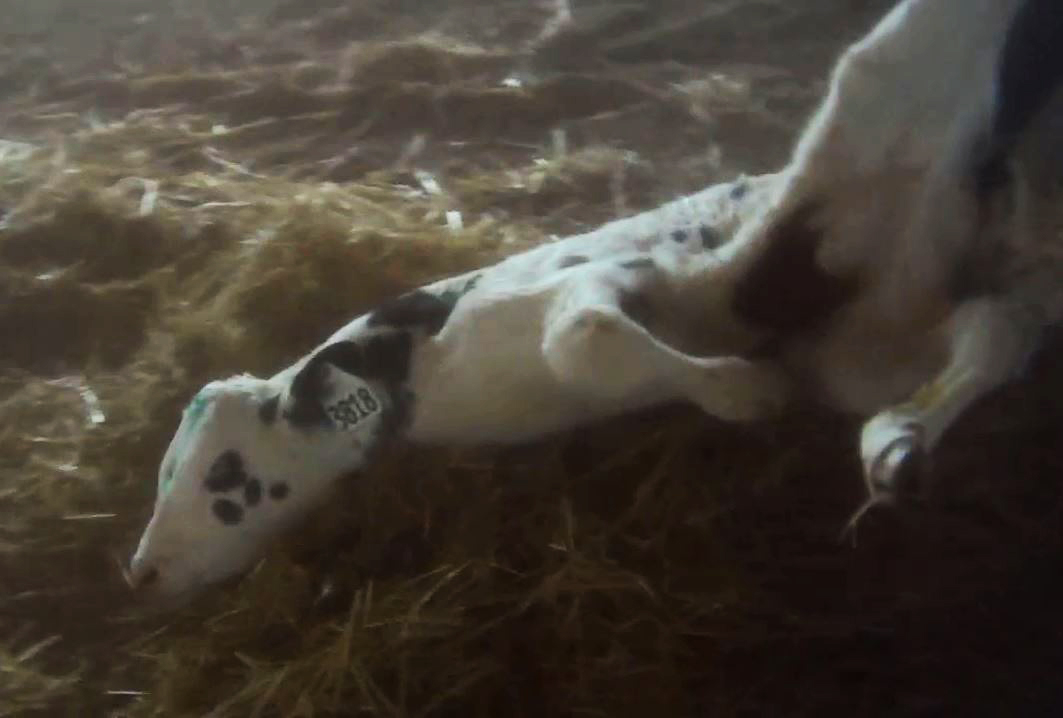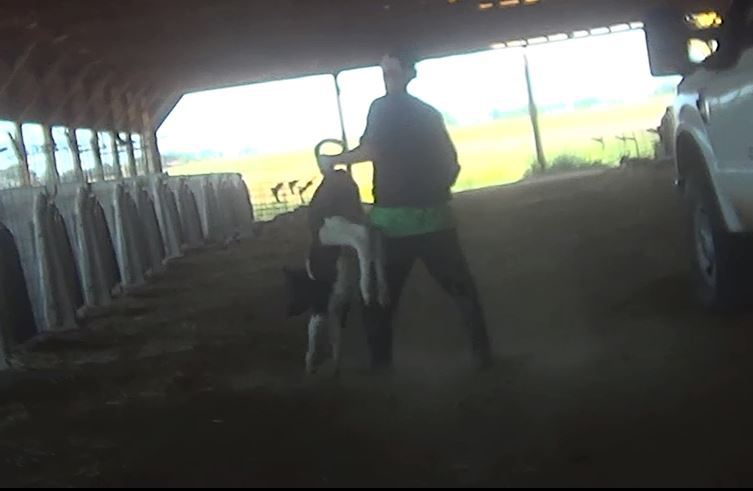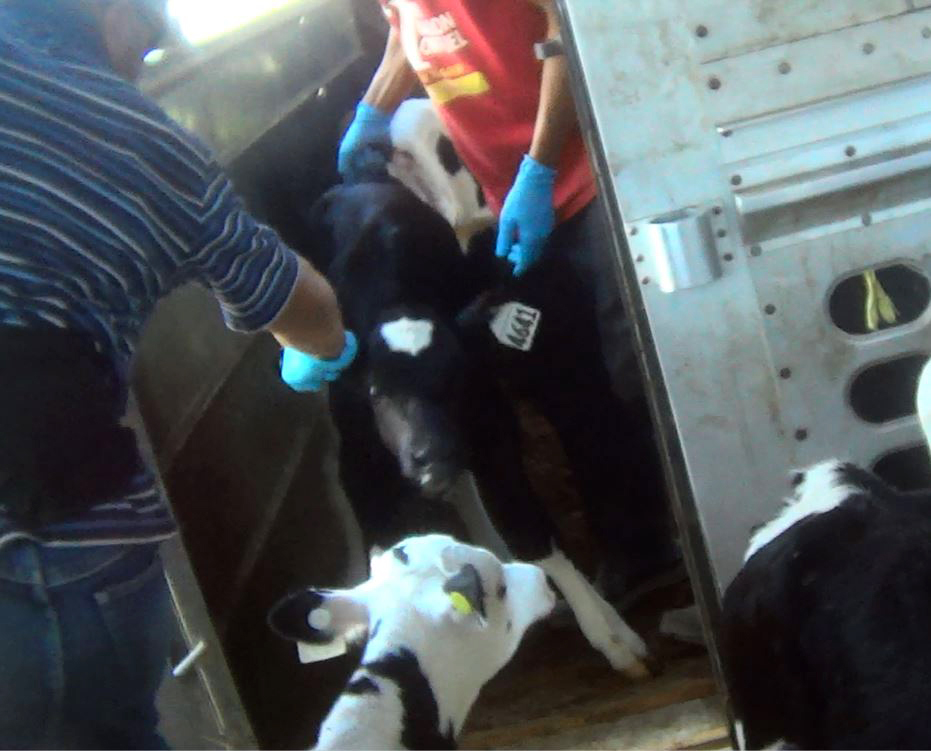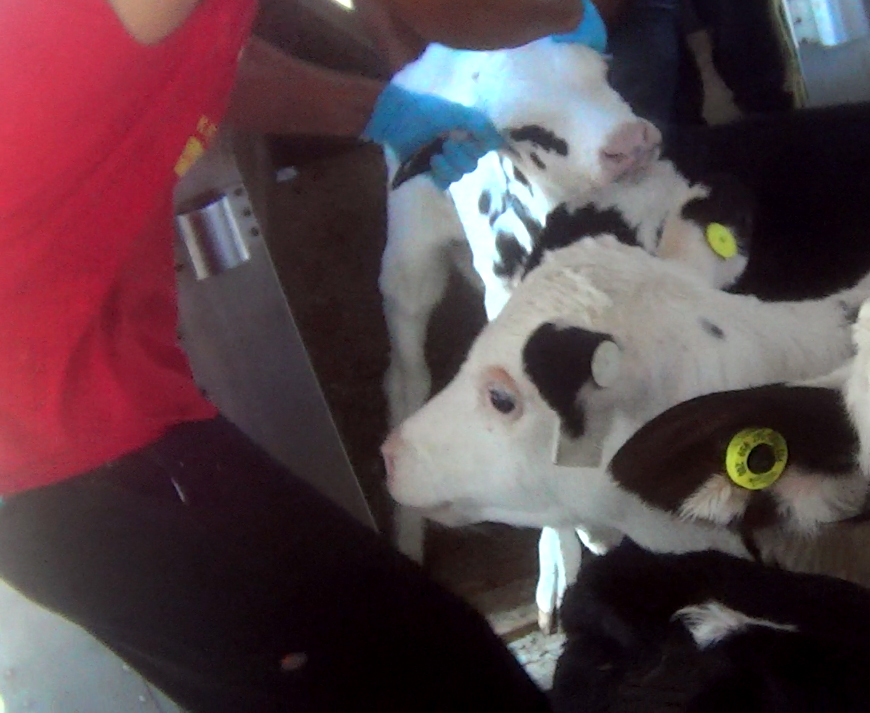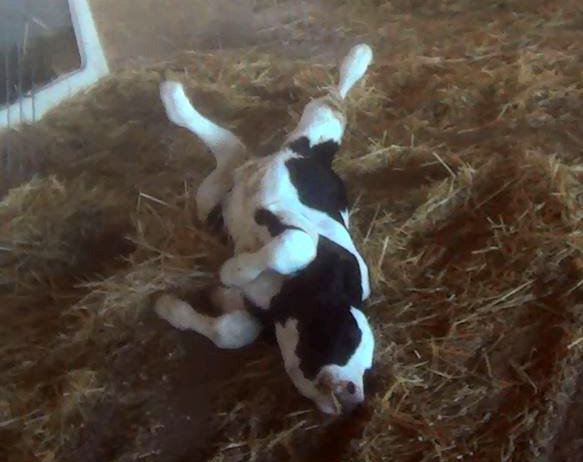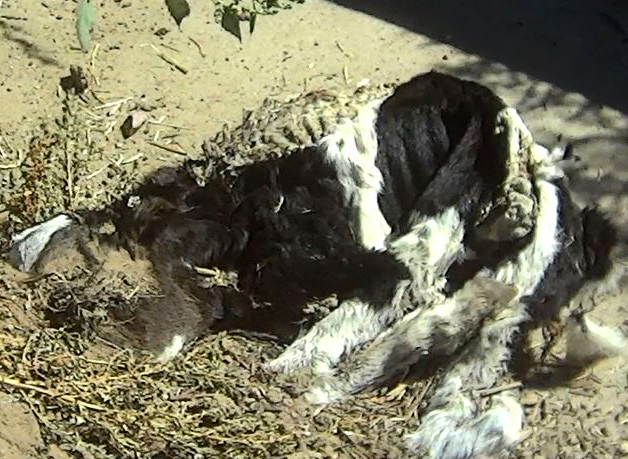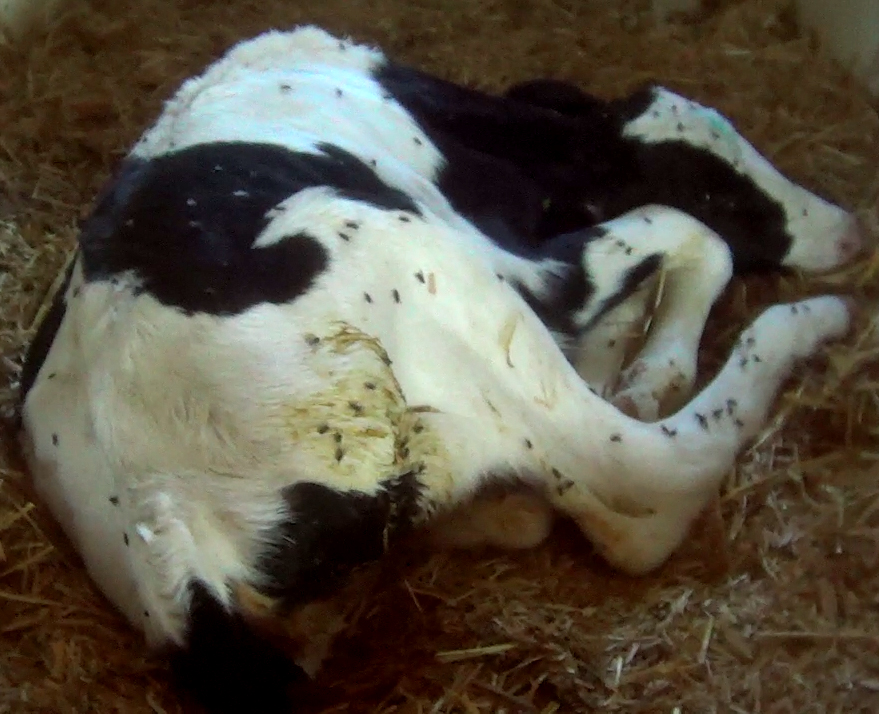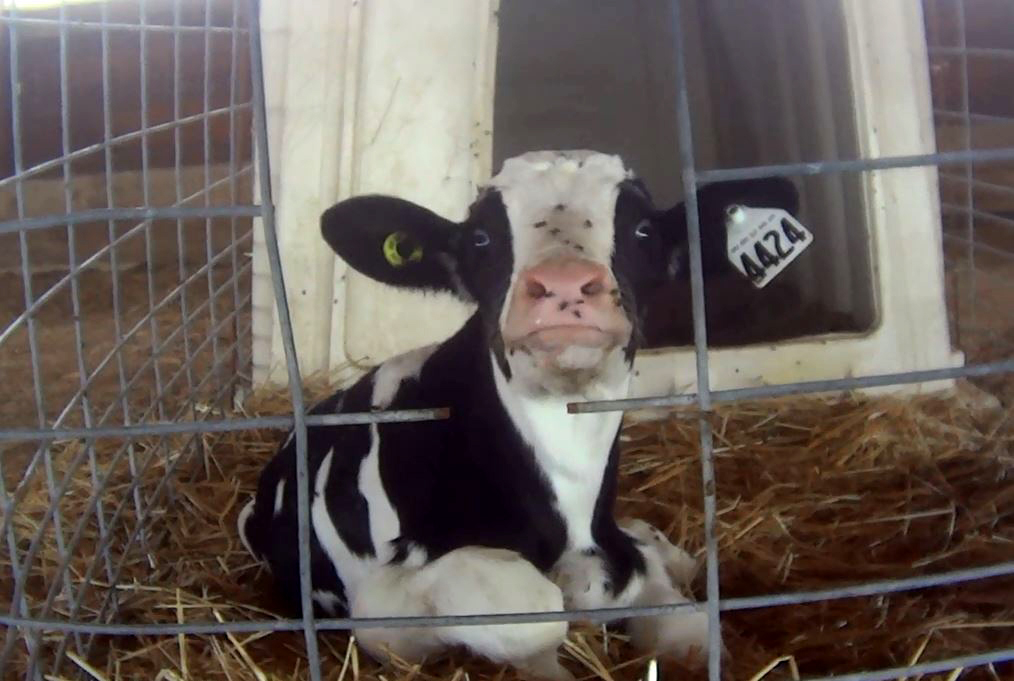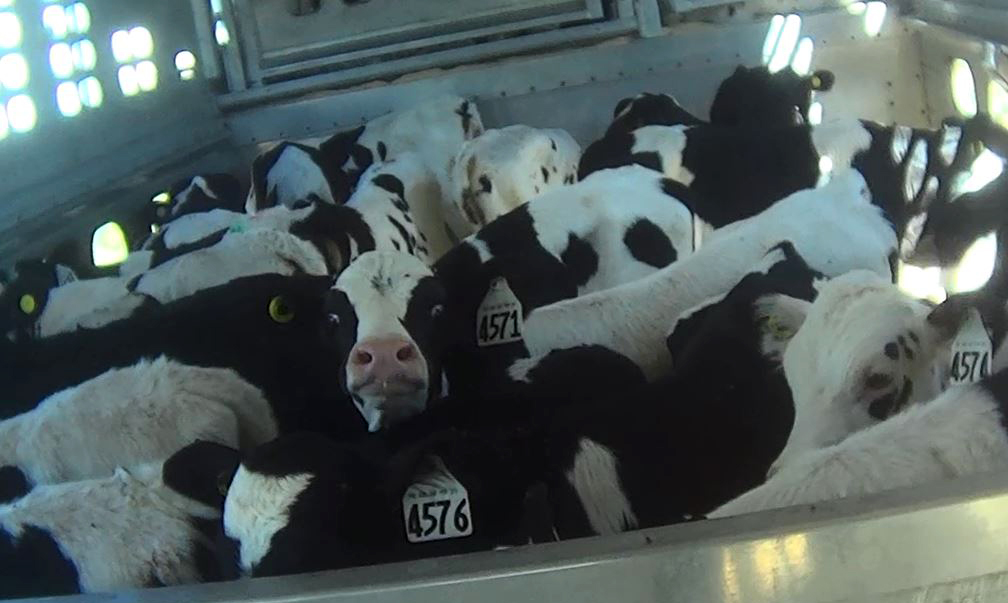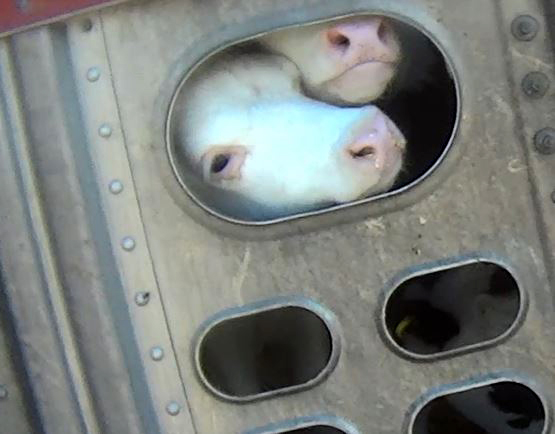- Like
- Digg
- Del
- Tumblr
- VKontakte
- Buffer
- Love This
- Odnoklassniki
- Meneame
- Blogger
- Amazon
- Yahoo Mail
- Gmail
- AOL
- Newsvine
- HackerNews
- Evernote
- MySpace
- Mail.ru
- Viadeo
- Line
- Comments
- Yummly
- SMS
- Viber
- Telegram
- Subscribe
- Skype
- Facebook Messenger
- Kakao
- LiveJournal
- Yammer
- Edgar
- Fintel
- Mix
- Instapaper
- Copy Link
Victory: We’re very pleased to announce that the unfounded charge against Animal Outlook’s courageous investigator Taylor Radig has been dropped. On Jan. 10, 2014, the Weld County District Attorney’s office filed a motion to dismiss the charge, noting that “the charges can’t be proven beyond a reasonable doubt.” Read more about the bogus charge and read Taylor’s message of heartfelt gratitude.
Criminal Cruelty Cases: The video footage showing hideous abuse of newborn calves that Taylor provided to authorities also led to criminal animal cruelty charges against three people who were caught by our camera abusing these very young and fragile animals:
All three defendants pleaded guilty to criminal cruelty to animals. Two were sentenced on April 29 and the third former Quanah Cattle Company employee was sentenced on June 2. During the April 29 court sentencing, the judge described the kicking, shoving, dragging and throwing of these calves, noting that our video was “disturbing to court.”
Highlights: Animal Outlook investigator wins Whistleblower of the Year & the Patty Shenker Animal Rights Activist Award.
In 2013, an Animal Outlook undercover investigator worked inside Quanah Cattle Co. (QCC), an animal agribusiness company in Kersey, Colorado that purchases newborn calves from surrounding dairy factories and temporarily confines them before shipping them out to be raised for their meat. Just days old, many of these calves – some of whom still have their umbilical cords hanging from their bodies – are too feeble or frightened to walk steadily. As our footage shows, in the process of being moved on and off trucks, these fragile animals are violently dragged by their legs, pulled by their ears, lifted by their tails, kicked, thrown, slammed, and flipped.
Animal handling expert Dr. Temple Grandin of Colorado State University decried the cruelty seen in our video, calling it “severe abuse” and “not acceptable” while further noting that “If this facility had been a slaughter plant, the USDA would have shut them down.”
The cruelty to calves uncovered in the Quanah investigation was so shocking and violent that we turned evidence over to local authorities and are now working with them on this case.
The Dairy Industry: Most of the dairy calves purchased by Quanah Cattle Company are male – they’re considered unwanted industry byproducts since they’re unable to produce milk. After being trucked in and unloaded at Quanah Cattle Company, they’ll be confined in crates or hutches for around a week and then loaded back on trucks to be shipped out, sold, and raised for their meat. Marketed as veal or beef, depending on their age when slaughtered, these young animals are the often forgotten victims of the dairy industry.
Please make a donation today to lend your support to our undercover investigators who painstakingly witness and document these hidden horrors in order to shine a bright light on the miseries forced upon farmed animals.
“If this facility had been a slaughter plant, the USDA would have shut them down.”
Dr. Temple Grandin
Quanah Cattle Company Investigation Photos
Investigation Expert Statements
Dr. Temple Grandin, animal handling expert, Colorado State University:
“The handling on this video was rough and not acceptable. If this facility had been a slaughter plant, the USDA would have shut them down.”
“The following events seen on this video are severe abuse – dragging by the ear, dragging by the foreleg and picking up the calf by the tail. Some of these calves had been picked up at the dairy when they were too young and had difficulty walking.”
“Loading and unloading was bad and they need to build some portable ramps for use in both the stock trailer and the large truck. Both vehicles were designed for adult animals. The dairies need to take responsibility for some of the problems on the video.”
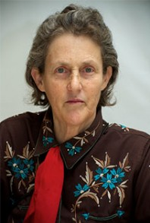
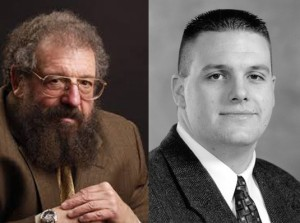
Dr. Bernard E. Rollin & Terry Engle, Professors of Animal Science, Colorado State University:
“Any person handling any animal in such a manner should not be allowed to work with any animals again. The same is true of the managers overseeing such abuse.”
“Given that these animals are virtually newborn Holstein baby calves … their treatment is even more egregious and unacceptable.”
“These workers should be prosecuted to the fullest extent the law allows.”
Holly Cheever, DVM:
The video showed “unnecessarily rough and painful treatment of young cattle, creating pain and suffering (both physical and psychological).”
“The workers depicted in this video exhibit poor husbandry techniques and do not have proper calf-handling training (or choose to ignore it) in the interests of speed, disinclination, or mere laziness.”
“[S]ome calves who appear to be ‘downers’ (i.e. non-ambulatory and unable to rise due to weakness or disabling injury) are kicked in the chest and abdomen to get them to rise - which is cruel.”

Criminal Cruelty Case Updates
June 2 Update
The third former Quanah Cattle Company employee who pleaded guilty to criminal cruelty to animals appeared in the Weld County Court for sentencing today. According a press release issued by the District Attorney’s office, he was sentenced to “two years supervised probation and ordered to pay a $500 fine. As conditions of probation, he must complete 300 hours of public service and a Making Better Choices class.”
April 29 Update
Two defendants who were charged with criminal animal cruelty in November (after our video was released) and subsequently pleaded guilty in February, appeared in the Weld County, Colorado court for sentencing. As reported by Channel 9 News in Denver, the judge recounted some of the cruelty to calves caught on video, noting it was “disturbing to the court.”
According to a press release issued by the Weld County District Attorney’s Office, both of these former Quanah Cattle Company employees were sentenced to “two years supervised probation and ordered to pay a fine of $500. As conditions of probation, each man must complete 300 hours of public service and a Making Better Choices class.”
April 3 Update
As reported on CBS-4 in Denver, the third former employee of Quanah Cattle Company who was charged with criminal cruelty to animals pleaded guilty today in Weld County Court. His sentencing is scheduled for early June.
Two other former Quanah Cattle Company employees who pleaded guilty earlier this year will be sentenced in late April (see details below).
Stay tuned for more updates as this case continues and check out the ongoing news coverage:
- CBS-4 in Denver: 3rd Man Pleads Guilty In Cattle Abuse Case
- Associated Press: Man Acknowledges Abusing Dairy Calves
“These workers should be prosecuted to the fullest extent the law allows.”
Dr. Bernard Rollin & Terry Engle
Press
- Man involved in alleged cattle abuse charged. 9News Colorado. January 21, 2014
- 1 of 3 Charged in Calf Abuse Case Pleads Guilty. CBS4 Denver. January 21, 2014
- Charges Against Undercover Investigator Taylor Radig Dropped. Ecorazzi. January 13, 2014
- Weld County drops charges against activist who taped alleged cattle abuse. The Denver Post. January 11, 2014
- BREAKING: Charges Dropped Against Investigator Who Filmed Animal Cruelty. Green is the New Red. January 11, 2014
- Charge Dropped For Woman Who Filmed Alleged Abuse. KKTV. January 10, 2014
- Charges dropped against animal activist in cattle cruelty case. 9 News. January 10, 2014
- Charge dropped for woman who filmed alleged abuse. Associated Press. January 10, 2014
- “I witnessed and reported animal abuse… and now was being charged with a crime myself.”. Green is the New Red. January 7, 2014
- Not Fair: Undercover Investigator Charged with Animal Cruelty. Ecorazzi. December 13, 2013
- Unfair charges against animal activist. The Denver Post. December 4, 2013
- Undercover activist who exposed animal cruelty is cited for animal cruelty . Salon. November 25, 2013
- Animal Abuse Whistleblower Charged for Not Blowing Whistle Fast Enough. Gawker. November 25, 2013
- Taylor Radig Filmed Alleged Cattle Abuse At Ranch, But Got Arrested For Not Reporting It Immediately . Huffington Post. November 24, 2013
- Animal rights activist who uncovered 'severe abuse' of baby calves being violently treated at Colorado cattle farm is cited for animal cruelty. Daily Mail UK. November 24, 2013
- Whistleblower in alleged newborn calves animal abuse case arrested. Fox31 Denver. November 22, 2013
- BREAKING: Undercover Investigator Charged With Animal Cruelty for Videotaping Farm Abuse. Green is the New Red. November 22, 2013
- Arrests Made After Undercover Video Captures Alleged Animal Abuse. Public News Service. November 18, 2013
- Colorado Sheriff Charges Three Men With Animal Abuse After Seeing Video. Food Safety News. November 18, 2013
- 3 In Weld County Face Abuse Charges After Cattle Video Released. CBS4 Denver. November 15, 2013
- 3 cited in Weld County animal abuse case involving calves. ABC7 News. November 15, 2013
- 3 face abuse charges after cattle video released. The Associated Press. November 15, 2013
- 3 cited in alleged calf abuse. NBC9 News Colorado. November 15, 2013
- Colo. investigates abuse claims at cattle facility. The Associated Press. November 15, 2013
- 3 workers in alleged animal abuse video fired, cited by Weld deputies. FOX31 News Denver. November 15, 2013
- 3 face abuse charges after cattle video released. The Times Union. November 15, 2013
- JD Heiskell Holdings in Tulare 'dismayed' by dairy calf abuse video. The Modesto Bee. November 15, 2013
- Deputies investigate treatment of calves at Weld County ranch. NBC9 News Colorado. November 15, 2013
- Undercover Investigation Reveals Baby Cow Abuse. VegNews. November 15, 2013
- Footage Reveals Dairy Farm’s Shameful Secrets. Global Animal. November 15, 2013
- Violencia salvaje contra becerros recién nacidos. Infobae. November 15, 2013
- Cielaki jak worki z ziemniakami. Koszmarny film. Sfora. November 15, 2013
- Colorado’da Hayvanlara Korkunç Muamele Gizli Kamerada!. Turkish NY. November 15, 2013
- Graphic Video Shows Workers Dragging, Tossing Calves. WFMY News 2. November 14, 2013
- Video shows livestock workers kicking, dragging, newborn calves. 10 News Tampa Bay. November 14, 2013
- Undercover Video Alleges Shocking Animal Abuse Of Newborn Calves At Colorado Facility . The Huffington Post. November 14, 2013
- J.D. Heiskell officials ‘dismayed’ over video images captured at its bull calf facility in Colorado. Tulare Voice. November 14, 2013
- COK Calls for Criminal Charges for Dairy Calf Cruelty. Ecorazzi. November 14, 2013
- Video shows abuse of bull calves. Dairy Herd Network. November 14, 2013
- Colorado dairy calf facility may face animal cruelty charges. The Examiner. November 14, 2013
- Compassion Over Killing's Colorado calves investigation. The Gay Vegans. November 14, 2013
- Video catches dairy workers kicking, dragging calves. NBC3 News Denver. November 13, 2013
- Animal group’s undercover video alleges animal cruelty at calf facility. FOX31 News Denver. November 13, 2013
- Video shows livestock workers kicking, dragging newborn calves. NBC9 News Colorado. November 13, 2013
- Cruelty alleged at Colo. facility owned by Tulare firm. The Business Journal. November 13, 2013
- Tulare feed company owns Colorado ranch in animal abuse video. The Fresno Bee. November 13, 2013
- Animal group’s undercover video alleges animal cruelty at calf facility. Colorado News Day. November 13, 2013
- Livestock industry, others outraged by animal abuse at Weld facility. The Greeley Tribune. November 13, 2013
Act Now
Quanah Animal Cruelty – Take Action, Choose Compassion
Sadly, animal cruelty is standard practice in the meat, egg and dairy industries. Whistleblowing exposés like this are often the only glimpse the public ever sees of the systemic mistreatment of farmed animals.
Rather than taking steps to prevent these abuses, animal agribusiness is trying to prevent consumers from finding out about them by lobbying for “ag-gag” laws that would criminalize undercover investigations—and the mere exposure of the truth.
The Dairy Industry
Like all mammals, including humans, cows produce milk to nourish their young.
In an effort to maximize how much milk they produce, dairy cows are typically impregnated every year. Often on the same day they give birth, their newborn calves are taken away – a separation that is emotionally devastating for both calf and mother. Her milk, intended for her calf, will instead be collected and sold in supermarkets for human consumption. Soon she’ll be reimpreganted and the cycle will start again.
The physical toll of several cycles of impregnation and milking is so extreme that after just a few years, cows are “spent,” and are no longer profitable for dairies. Thus, these young but “spent” cows, who are especially prone to lameness and other illnesses, are sent to slaughter for ground beef, even though they can naturally live to be 25 years old.
Female calves born in the dairy industry are likely to join their mothers on the dairy line, once old enough. Males however, don’t produce milk and are considered byproducts of the industry and may be sold to calf-raising companies like Quanah Cattle Co. They are likely to be raised for their meat, which may be marketed as veal or beef, depending on their age when slaughtered.
Read more about the dairy industry’s unethical practices that Animal Outlook has uncovered.
Act Now: Choose Compassion
Choosing compassion is as easy as choosing the vegan versions of your favorite foods. Grocery stores everywhere are stocking up on dairy-free options to keep up with the growing demand. Here’s a list of some of our favorite protein-packed plant-based milk alternatives:
• Almond Breeze Almond Milk • Silk Almond, Coconut, and Soy Milks • So Delicious Coconut Milk • Rice Dream Rice Milk


